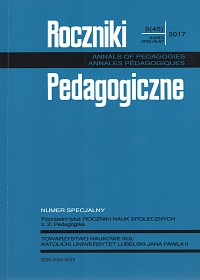Formation as a Key Element in Edmund Bojanowski’s Conception of Education
Main Article Content
Abstract
The article deals with formation which in Edmund Bojanowski’s approach constitutes one of the structural elements of the process of education. A founder of orphanages, Bojanowski puts forward the conception of integrated education understood as a method of moral, spiritual and religious formation implemented in the process of shaping children’s attitudes with the use of stories, songs and rituals. The goal of this method is to form a child from within and to help them prepare for an independent, responsible and good life. The instructor or the teacher plays the most important role in the process of formation, as they set an example for children with their own lives, thus shaping children’s moral and religious attitudes. The natural connection between formation and poetry preconditions the choice of instruments of moral upbringing, including tales, songs and rituals.
Article Details
References
Brezinka, W. (1957). Erziehung als Lebenshilfe. Ein Beitrag zum Verständnis der pädagogischen Situation. Wien: Österreichischer Bundesverlag.
Brezinka, W. (1993). Erziehung in einer wertunsicheren Gesellschaft. Beiträge zur Praktischen Pädagogik. München: Ernst Reinhardt Verlag.
Brezinka, W. (2003). Erziehung und Pädagogik im Kulturwandel. München: Ernst Reinhardt Verlag.
Denek, K. (1999). Aksjologiczne aspekty edukacji szkolnej. Toruń: Wydawnictwo Adam Marszałek.
Gigilewicz, E., Opiela, M.L. (red.) (2016). Prace, szkice i notatki Edmunda Bojanowskiego. Inedita. T. I i II. Lublin: Zgromadzenie Sióstr Służebniczek BDNP.
Górniewicz, J. (2007). Teoria wychowania (Wybrane problemy). Olsztyn: Olsztyńska Szkoła Wyższa im. Józefa Rusieckiego.
Groothoff, H.-H. (1989). Erzieher. W: D. Lenzen (red.), Pädagogische Grundbegriffe. T. I (s. 424-429). Reinbek bei Hamburg: Rowohlt.
Gurycka, A. (1979). Struktura i dynamika procesu wychowawczego. Analiza psychologiczna. Warszawa: Państwowe Wydawnictwo Naukowe.
Herbart, J.F. (2007). Pedagogika ogólna wywiedziona z celu wychowania (tł. T. Stera). Warszawa: Wydawnictwo Akademickie „Żak”.
Kunowski, S. (2003). Wartości w procesie wychowania. Wstęp i wybór tekstów B. Lenarczyk. Kraków: Oficyna Wydawnicza „Impuls”.
Łobocki, M. (2004). Teoria wychowania w zarysie. Kraków: Oficyna Wydawnicza „Impuls”.
Nelson, L. (1949). System der philosophischen Ethik und Pädagogik. Göttingen: Öffentliches Leben.
Nohl, H. (1988). Die pädagogische Bewegung in Deutschland und ihre Theorie. Frankfurt a. M.: Vittorio Klostermann.
Nowak, M. (2008). Teorie i koncepcje wychowania. Warszawa: Wydawnictwa Akademickie i Profesjonalne.
Okoń, W. (2001). Nowy słownik pedagogiczny. Warszawa: Wydawnictwo Akademickie „Żak”.
Opiela, M.L. (red.) (2016). Kompendium edukacyjne Edmunda Bojanowskiego. Lublin: Wydawnictwo Episteme.
Opiela, M. (2013). Integralna pedagogika przedszkolna w systemie wychowania Edmunda Bojanowskiego. Kontynuacja i zmiana. Lublin: Wydawnictwo KUL.
Rynio, A. (1999). Szkoła w wychowaniu moralnym. W: A. Rynio (red.), Pedagogika katolicka. Zagadnienia wybrane (s. 359-372). Stalowa Wola: Oficyna Wydawnicza Fundacji Uniwersyteckiej w Stalowej Woli.
Szewczak, I. (2013). Dziecko i dzieciństwo w wymiarze moralnym. W: J. Daszykowska, A. Łuczyński (red.), Dziecko w przestrzeni życia społecznego (s. 51-70). Stalowa Wola: Wydział Zamiejscowy Nauk o Społeczeństwie Katolickiego Uniwersytetu Lubelskiego Jana Pawła II w Stalowej Woli.
Zdybicka, Z. (2005). Wychowanie a religia. W: P. Jaroszyński, P. Tarasiewicz, I. Chłodna (red.), Filozofia i edukacja (s. 75-89). Lublin: Fundacja „Lubelska Szkoła Filozofii Chrześcijańskiej”.
